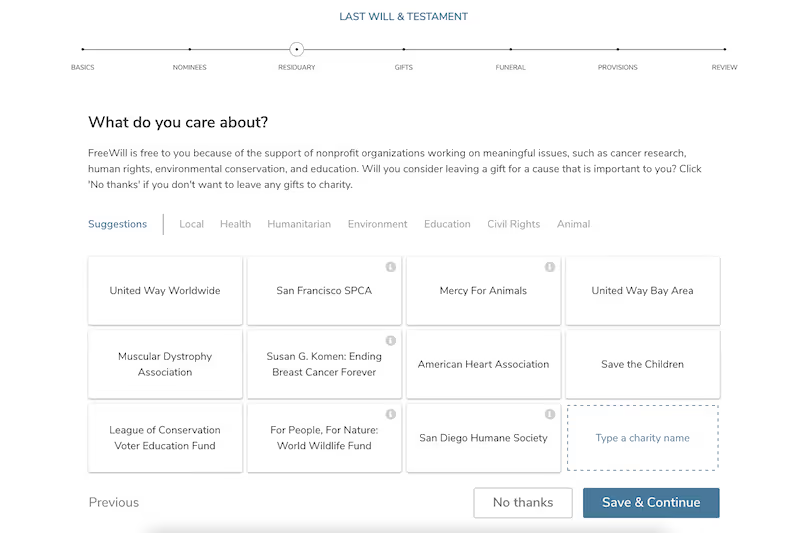Many people don’t know it, but you can donate to a charity or nonprofit organization by naming them as a beneficiary in your will. These bequests to charity are often called planned or legacy gifts. And they’re a meaningful, effective way to create a lasting legacy, both for yourself and for causes that are closest to your heart.
How do you donate to a charity in your will?
Donating to charity in a will is a three-step process:
- Choosing your gift type and amount (special gift Vs % of assets)
- List the organization as a beneficiary (choose what kind of beneficiary)
- Notify the organization (optional)
Let's look at each step in detail:
1. Decide what you want to leave for the charity.
When it comes to leaving a bequest for a charity, you have a couple of options:
- Name the charity as the primary beneficiary for a specific gift, such as a certain amount of money or stock.
- Allocate a percentage of your total estate to a charity. Many people choose to leave 10% of their estate to a cause that’s close to their heart when they make their wills on FreeWill.
What can you donate to a charity in your will?Many people choose to leave money to a charity in their will, but you can give any of your assets to a nonprofit. This includes:- Financial assets, like cash, stocks, bonds, or cryptocurrency
- Real estate (you can even donate your house to charity!)
- Personal property, like your vehicle, jewelry, or artwork
- You can also name a charity as the beneficiary of a non-probate asset, like your life insurance policy, retirement account, or IRA
2. Name the charity as a beneficiary in your will.
Once you decide which assets to leave to your charity of choice, you should list the organization as a beneficiary in your will. To identify the charity, it’s helpful if you list the organization’s:
- Full name
- Street address
- Employer Identification Number (EIN).
The EIN is a unique number issued by the IRS to a business entity. Including a charity’s EIN makes it clear exactly which charity you’re donating to. This is helpful in case multiple charities exist with the same name. You can find a charity’s EIN by doing a quick internet search or checking the IRS’s Tax Exempt Organization Search database.
If a charity has multiple chapters, each chapter will likely have its own EIN. So if you wanted to donate to your local chapter of a national nonprofit — for example, Big Brothers Big Sisters — you’d use that branch’s specific EIN.
You should also decide what kind of beneficiary you want the charity to be:
- Primary beneficiary: The charity will receive whatever assets you assign to them — for example, a cash gift.
- Secondary beneficiary: If your primary beneficiary passes away before you, your estate would go to the next beneficiary in line — in this case, your preferred charity.
- Residuary beneficiary: The charity will receive any assets that you didn’t specifically name a beneficiary for in your will.
If you use FreeWill to create your will, there’s a section where you can easily add charitable gifts. If the charity is a FreeWill partner, you simply select them from the list. If not, you can still donate, but you may want to enter the organization’s address and EIN number to make sure your gift goes to the right place.

3. Let the charity know about your gift.
Since charities rely on donations for funding, it’s easier for them to forecast their finances if they know about your legacy gift in advance. Most charities are grateful for donations and want to thank donors like you!
Many nonprofits have a page on their website under “Planned giving” or “Legacy giving” that includes a form or an email for you to reach out and notify their team that you’ve left a gift to them in your will.
If you use FreeWill to leave a gift to charity, we’ll let them know about your gift so you don’t have to. (Your bequest will remain anonymous unless you give us permission to share your contact information.) This is an optional step, but a wonderful way to create a legacy. The support of our nonprofit partners — and the generosity of will-makers who donate to them — is what makes FreeWill’s will forms completely free for everyone to use.
If you plan to donate your assets to a nonprofit instead of passing them on to relatives, consider telling your loved ones so there aren’t any surprises.
Why donate to a charity in your will?
There are so many wonderful reasons to leave a bequest for a charity that matters to you. Here are a few:
- It allows you to give back to the causes you love. Nonprofits depend primarily on donations to fund their programs and outreach. By donating to a cause you care about, you’re directly helping that organization make an impact.
- It costs you nothing now. For most people, a gift in their will is the largest donation they’ll ever make. This gift will have a significant impact on a cause you care about without putting any financial stress on you during your lifetime.
- You create a legacy that lasts beyond your lifetime. None of us will live forever. But, by donating part of your estate to a nonprofit, you can continue making an impact long after you’re gone.
What are the best charities to donate to?
The answer to this question will depend on what causes are important to you. Perhaps you’ve already decided on a charity (or two, or three) you’d like to donate to.
If you want to donate to a charity but aren’t sure which to choose, here are some questions you can ask yourself:
- Which causes matter to you? There are thousands of different charities, and most fall into a specific category, such as environment, education, health, social justice, or arts and culture. If you’re concerned about nature and conservation, for example, you might like to donate to an environmental charity. If you’re passionate about equality, perhaps a social justice charity would be a good fit for your values.
- What’s the organization accomplishing? Consider if the organization is making an impact on causes you care about, and if funding is going to programs you want to support. In your will, you can even name specific programs you want your bequest to be used for.
- How transparent is the organization? It should be clear how the organization is structured and who runs it. If it’s important to you, you can research the charity’s board members to better understand their viewpoints and experience.
If you’re looking for a list, you can start your search for the perfect charity on Charity Navigator. Charity Navigator independently reviews nonprofits and provides in-depth ratings and analysis. You can search for top-rated charities, filter charities by category, and more.
FreeWill also has a list of reputable charities built into our online will-maker. If you’d like to donate, you can simply browse this list while making your will, pick one, and go. If you don’t see your preferred charity, you can still put in their name and information to donate a gift in your will.
Create a lasting legacy
Donating to charity in your will is a meaningful way to support causes that matter to you. A bequest costs you nothing now, but is a high-impact gift that will empower your favorite organizations for years to come.
FreeWill has helped nonprofits raise more than $2.5 billion since 2017. If you’d like to join the 250,000 people who have already made their will on our website, you can get started here.
Make your free estate plan today

Make your free advance healthcare directive

Make your free durable power of attorney

Make a stock donation today

Make your free revocable living trust










